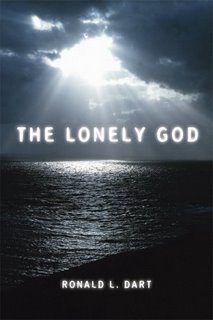"The Lonely God" --A Review

I just finished reading a very good book written by one of my friends and mentors, Ronald L. Dart. The name of the book is The Lonely God.
The author would rightfully describe himself as a Christian apologist and would hope that his students aspire to and be qualified to explain and defend the Christian way of life, ergo, become apologists, themselves. His writing style is very much like his upbeat radio program, Born To Win: uplifting, inspiring and compelling. His reasoned approach is fascinating and thought provoking.
The Lonely God delves into many areas of God's realm about which we may not have given much thought, for example, why did he create mankind and why did he allow Adam and Eve to screw up in the Garden of Eden. Does God read our minds and is he continually spying on us? Does he know what we're going to do before we even do it? Can God travel through time? If he answers some little prayers, why doesn't he answer our big prayers and what is our responsibility in the process? Why does really bad stuff happen to innocent people? If he is eternal, then what has he been doing for trillions of years and was he alone all that time? Does God have a plan for mankind and how can we possibly know what it is?
The author doesn't attempt to answer every mystery of the universe or the God who created it nor should we be flummoxed by unanswerable conundrums which may arise with the very thought of eternity. But we can know all we need to know about God by having an understanding of the Bible and by learning what he has in store for mankind.
In 26 chapters of The Lonely God the author deals with very real problems and misconceptions people have with God, truth and dogma. One essential concept to understanding God as he is, is found in the third chapter, titled Open to God. The author begins the chapter by writing:
There is no explanation of God offered by man that can do anything but diminish God. And the further we go in trying to explain God, the further we go down a cul-de-sac. The creation of dogma is a major barrier. If we don't stay open to him, to his revelation of himself, we can never hope to understand. Dogma closes that door.In other words (and these are mine, not the author's), when religions and churches mold God into whatever image they have of him and worship him as such, they may have a distorted or false concept of God because dogma gets in the way of what he really is.
God is. God is what he is regardless of what we think or say. And God presents us with questions we cannot hope to resolve with dogma. We have to take him as he reveals himself to us over time, or we can never know him at all.
There's an important chapter in the book on Liberty. We all want it, but we don't want to deal with its consequences and all too often we will forsake liberty for safety or security. Freedom comes with an awesome responsibility. The Law of God ( the ten commandments), was called the Law of Liberty by James and Paul. No one will ever coerce you to keep the laws of God; we are free to obey them or disobey them, just as Adam and Eve had the choice to obey or disobey them. Nor do God's laws take away our freedom. Rather, it is the law of man that entangles us and takes away our liberty.
Throughout the book, the author posits ideas which may force you to think outside the box of preconceived ideas. One such idea is dubbed the Great Misunderstanding in chapter 12, in which he tackles the idea that the law wasn't done away in the New Testament. He doesn't shy away from controversy, but he's never in your face about it. Some so-called Biblical controversies boil down to a matter of semantics, and more often than not, dogma gets smack dab in the way of rational conjecture on any given subject.
The Lonely God doesn't attempt to "sell" any particular brand of beliefs or religions. It's a thoughtful look at God, his plan, and how he deals with man by a lifelong student and teacher of the Bible. The book shows opposing sides of God...that he is eminently good, the personification of love, kind and benevolent, merciful and generous, and, above all things, Almighty. Though loving and merciful, he's not a God to be taken lightly. To quote the author, God is "dangerous."
I recommend the book very highly. It's well thought out and well written. It's not opinionated and is never argumentative. The book inspires, but I don't think that's the purpose of the book. More than anything, the book evokes thought about lofty concepts and ideas deserving of our time.


<< Home